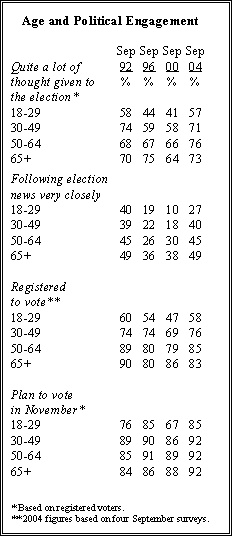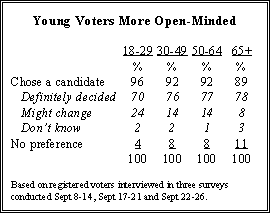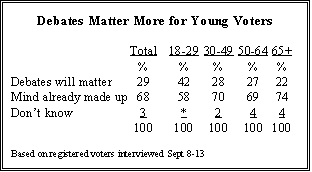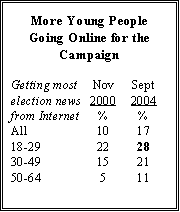
Like other Americans, young people express much more interest in politics and voting than they did at this stage in the election four years ago. But people under age 30 continue to lag behind their elders in political interest and voting intention. Young voters also have been far less consistent in their candidate support, seesawing in recent weeks between John Kerry and George Bush.
In September polls conducted by the Pew Research Center, 57% of those under age 30 say they are giving a lot of thought to the upcoming election. That compares with just 41% of young people who said they were thinking a lot about the election at this stage four years ago, and 44% in 1996. Older people, those age 30 and older, continue to express more interest in the election more than seven-in-ten in each older age group say they are giving a great deal of thought to the election.
There also has been an across-the-board increase in interest in election news compared with four years ago, with the percentage of young people following this news very closely nearly tripling (from 10% to 27%). Even so, significantly fewer Americans under age 30 than older people track campaign news very closely.
The percentage of young people who say they are registered to vote also has increased significantly since 2000 from 47% to 58%. The number who are registered is at the 1992 level (60%). And the number of young registered voters who say they plan to vote in November has reached 85%, up from 67% four years ago.
Youth Vote Fluctuates

Over the past month, young voters have displayed significantly more volatility in their candidate preference than most other groups in the population. In Pew’s most recent poll, President Bush leads John Kerry by a margin of 48% to 42% among registered voters 18-29. Just a week earlier, Kerry led by 53% to 35% among this group. And two polls earlier in September found the same pattern of shifting support. In fact, young voters have moved in the same direction as the overall trends in the polls, but their swings have been more extreme than the rest of population. In 2000, Gore and Bush ran about even among young people (Gore 48%, Bush 46%), according to exit polls by the Voter News Service.
Interestingly, more young voters than older voters express a candidate preference just 4% of those under 30 voiced no preference in Pew polls conducted in September, compared with higher percentages in older age groups. Yet young voters, once having expressed a preference, also are far more likely than others to say they may change their mind before the election. Roughly a quarter of voters age 18-29 (24%) say they might shift their support before Election Day, the highest percentage of any age group.

In that regard, a relatively large proportion of young voters (42%) say the upcoming presidential debates will influence their voting decision. In older age groups, where far more voters say their minds are already made up, fewer than three-in-ten say the debates will matter in their voting decisions.
Young Log on for Election News
Since the 2000 campaign, the Internet has become a more important source of election news for all Americans, but young people continue to go online for election news at higher rates than do older Americans.

Nearly three-in-ten of those age 18-29 say they get most of their election news online, up from 22% in November 2000. That compares with 21% of those age 30-49, and smaller percentages of older people, who get most of their election news from the Internet.




